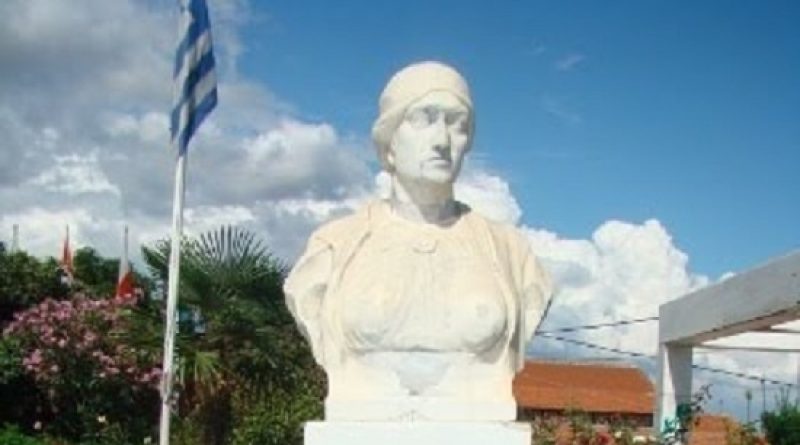Domna Visvizi: The Thracian captain
Thrace’s proximity to Constantinople, the capital of the Ottoman Empire, and the multicultural nature of the region, with its solid populations of Ottoman, Greek and Jewish residents, meant it did not participate in the Greek Revolution to the degree that Rumeli and the Morea did. However, many fighters from Thrace actively participated in the fight for independence, sacrificing their property or even their lives.[1]
Among the Thracian heroines of the 1821, Domna Visvizi, called the “Bouboulina of Thrace”,[2] stood out for her action. She was born in 1783 in Ainos in eastern Thrace, the daughter of a wealthy family. At the age of 25, she married a Thracian fighter, Captain Hatzi-Antonis Visvizis, and they had five children.
The two were members of the Philiki Etaireia and from 23 March 1821 they became involved in naval battles in the Aegean and in sieges on land. In particular, on Captain Visvizis’ legendary ship Kalomira, which had 14 cannons and a crew of 140 sailors, they fought with vigour in the naval battles of Samos, Lesvos and Evripos.[3] Also they participated in the operations of Ypsilantis, Androutsos and Nikitaras, which aimed to stop the descent of Pasha Dramalis into southern Greece.[4]
However, in the naval battle of Evripos, which took place on 21 July 1821, Captain Visvikis was murdered in unclear circumstances. From that moment, Domna, with an unwavering attitude, took over the reins of the ship and the coordination of the war actions. For this reason, Dimitrios Ypsilantis called her “kind and brave”.[5]
For about three years after the death of her husband, that is from 1821 to 1824, the captain patrolled the coasts of Evia, either transporting munitions or participating in sieges. This earned her an accolade from Odysseus Androutsos, who called her a “benefactor” of the nation.[6]
However, the expense for the maintenance of Kalomira became unbearable and she had invested all her property in the fight for independence. Thus, in September 1824 she handed over the legendary ship to the Greek government. Later that year, it completely destroyed the frigate of the Ottoman admiral Hazne Gemnisi.[7]
After handing over her ship, the captain and her children lived impoverished, despised and wandering from place to place, such as Nafplio and Ermoupoli on Syros, seeking help from the Greek government. The Greek authorities, after her constant appeals for financial aid and as compensation for her contribution to the struggle, in 1824 gave her a house in Nafplio that had two rooms, without doors and windows. In addition, they granted her the minimum pension – 30 drachmas – given to fighters.[8] She died in 1850, in Piraeus, old and forgotten.[9]
Within the framework of bicentenary of the Greek Revolution, theatrical[10] and musical[11] performances, as well as student competitions,[12] were organized in honour of Domna Visvizi. In the same context, the mayor of Alexandroupoli, together with other representatives from the political and military authorities of the region, on 19 September 2021 laid wreaths at the monument of Domna Visvizi that dominates the city lighthouse, in her honour and in honour of all Thracian fighters.[13] Finally, every year, the Thracian Women’s Union of Athens “Domna Hadzi–Antonis Visvizis” organizes an event commemorating the Thracian captain in the grounds of the Pedion tou Areos, where a bust of the heroine has stood in a prominent position since 2005.[14]
Vasiliki Filiou, PhD candidate in modern and contemporary history at the Department of History and Ethnology, Democritus University of Thrace
[1] Moschos Koukos, Ο ελληνισμός της Θράκης στον αγώνα του 1821 [Hellenism of Thrace in the Struggle of 1821] (Thessaloniki: Erodios, 1998). See Thanasis Mousopoulos, “Η Συμβολή των Θρακών στην Επανάσταση του 1821” [The Contribution of the Thracians to the Revolution of 1821], talk on the online show “Kastrinoi Dialogoi” of the Didymoteicho cultural association Kastropolites, 16 March 2021, https://www.facebook.com/kastropolites/videos/881508296025246.
[2] “Καπετάνισσα Δόμνα Βισβίζη (1783-1850)” [Captain Domna Visvizi (1783-1850)], Ainites cultural association, http://ainites.gr/wp-content/uploads/2016/04/%CE%94%CE%9F%CE%9C%CE%9D%CE%91-%CE%92%CE%99%CE%A3%CE%92%CE%99%CE%96%CE%97.pdf.
[3] Ibid
[4] “Δόμνα Βισβίζη: Η ηρωική ναυμάχος του ’21 που πέθανε φτωχή και ξεχασμένη” [Domna Visvizi: The heroic sailor of the ’21 who died poor and forgotten], cognoscoteam.gr, 14 January 2020, https://cognoscoteam.gr/%CE%B4%CF%8C%CE%BC%CE%BD%CE%B1-%CE%B2%CE%B9%CF%83%CE%B2%CE%AF%CE%B6%CE%B7-%CE%B7-%CE%B7%CF%81%CF%89%CE%B9%CE%BA%CE%AE-%CE%BD%CE%B1%CF%85%CE%BC%CE%AC%CF%87%CE%BF%CF%82-%CF%84%CE%BF%CF%85-21-%CF%80/.
[5] Ibid.
[6] “Δόμνα Βισβίζη: Η Θρακιώτισσα του 1821” [Domna Visvizi: The Thracian woman of 1821], pmeletios.com, https://www.pmeletios.com/newSite/index.php/23-%CE%B5%CE%B8%CE%BD%CE%B9%CE%BA%CE%B1-%CE%B8%CE%B5%CE%BC%CE%B1%CF%84%CE%B1/1490-%CE%B4%CF%8C%CE%BC%CE%BD%CE%B1-%CE%B2%CE%B9%CF%83%CE%B2%CE%AF%CE%B6%CE%B7-%CE%B7-%CE%B8%CF%81%CE%B1%CE%BA%CE%B9%CF%8E%CF%84%CE%B9%CF%83%CF%83%CE%B1-%CF%84%CE%BF%CF%85-1821
[7] “Δόμνα Βισβίζη: Η ηρωική ναυμάχος του ’21 που πέθανε φτωχή και ξεχασμένη” [Domna Visvizi: The heroic sailor of the ’21 who died poor and forgotten].
[8] “Δόμνα Βισβίζη: Αρχικαπετάνισσα της Θράκης” [Domna Visvizi: Chief captain of Thrace], 24grammata, 12 November 2021, https://24grammata.com/%CE%B4%CE%BF%CE%BC%CE%BD%CE%B1-%CE%B2%CE%B9%CF%83%CE%B2%CE%B9%CE%B6%CE%B7-%CE%B1%CF%81%CF%87%CE%B9%CE%BA%CE%B1%CF%80%CE%B5%CF%84%CE%B1%CE%BD%CE%B9%CF%83%CF%83%CE%B1-%CF%84%CE%B7%CF%83-%CE%B8%CF%81/.
[9] “Δόμνα Βισβίζη: Η ηρωική ναυμάχος του ’21 που πέθανε φτωχή και ξεχασμένη” [Domna Visvizi: The heroic sailor of the ’21 who died poor and forgotten].
[10] Such was the theatrical performance entitled “Δόμνα Βισβίζη” [Domna Visvizi], presented by the Youth Centre of the Dormition Parish, Corinth, on 22-25 March 2014, part 1 (https://youtu.be/WH9XXP1OqhI) and part 2 (https://youtu.be/3qA4AsiBK-o).
[11] Such was the musical event entitled “Domna’s Song”, presented on 2-4 April 2021, at the National Opera (https://www.nationalopera.gr/en/alternative-stage/es-music-theater/item/3638-to-tragoydi-tis-kyra-domnitsas)
[12] Characteristically, on 1 April 2022 the 3rd Gymnasium of Alexandroupoli “Domna Visvizi” received first place in an interregional schools writing competition marking the bicentenary. “Νέα πρωτιά για το 3ο Γυμνάσιο Αλεξανδρούπολης ‘Δόμνα Βισβίζη’”, I Gnomi, 5 April 2022, https://www.gnomionline.gr/nea-protia-gia-to-3o-gymnasio-alexandroupolis-domna-visvizi/.
[13] “ Κατάθεση στεφάνων στο μνημείο της Δόμνας Βιζβίζη στην Αλεξανδρούπολη” [Laying of wreaths at the monument of Domna Vizvizi in Alexandroupoli], YouTube, 19 September 2021, https://youtu.be/BH41iNIdxmQ.
[14] “Τιμή και δόξα στη θρακιώτισσα καπετάνισσα Δόμνα Βισβίζη (Πεδίον του Άρεως)” [Honour and glory to the Thracian captain Domna Vizvizi (Pedion tou Areos)], velosnews.com, article posted on 20 March 2017, http://www.velosnews.com/2017/03/blog-post_20.html.
Picture: Προτομή Δόμνας Βισβίζη
Source: https://www.orthodoxianewsagency.gr/epikairotita/domna-visvizi-mia-thrakiotissa-
iroida/

